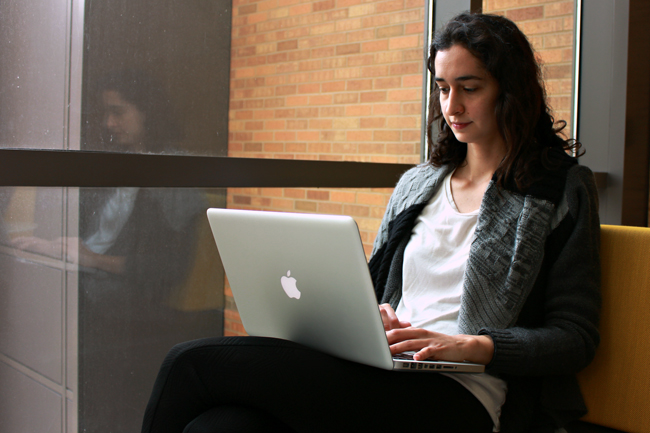Corporate communications senior Stephanie Robalino walks out of class and heads to a nearby coffee shop. She has a few hours to kill, so she sits down and flips open her laptop. Instead of turning on Netflix or sifting through Buzzfeed articles, she rebuilds a company’s website and analyzes competitors. By the time her next class rolls around, she’s earned $30.
Robalino is part of the trend of students across the nation working in virtual internships. From the comfort of a coffee shop between classes or her bedroom at 1 a.m., Robalino completed a seven-month-long internship for Too Good Strategy, a business-consulting agency. She helped build a new website for the company, researched competing agencies and organized her boss’ notes — all done without stepping foot in the office.
“Virtual working in general is pretty normal,” Robalino said. “You see a bunch of people working in coffee shops every day. It was a big selling point for me.”
Virtual internships allow people to gain experience while working remotely for a company. Interns communicate with their employers via email, text, Skype and other forms of digital communication. Over the past few years, websites such as Internships.com and InternMatch.com have added virtual options to their sites.
“I’d say that it’s growing, and it’s a huge value added for students,” said Robert Vega, director of career services in the College of Liberal Arts. “You can do a virtual internship with someone, say in San Francisco or London, during the semester.”
Instead of going into the office for meetings, Robalino had weekly 20-minute phone calls with her boss and the rest of the team. She logged her 10 hours a week on an online accounting software and earned $10 an hour.
“I wanted an unstructured environment,” Robalino said. “I like being able to work on my own time and not be tied down by certain time restrictions.”
Over the summer, journalism sophomore Jazmyn Griffin interned at an online music publication called ABScream Media, but her boss lived nearly 2,000 miles away in Boston. She interviewed musicians and wrote stories for the site at the same time she was taking summer classes at UT.
“You get to write for a type of publication that may not be available in your area,” Griffin said. “Some people live in the middle of nowhere, so they might not have a local music magazine that they could be a part of.”
While this type of internship eliminates commuting to work, provides flexible hours and saves companies workspace, it comes with challenges and criticisms.
“Some of the challenges for students, especially for those where it might be their first professional opportunity, are, ‘How do you communicate with a supervisor virtually?’” Vega said. “‘How do you receive feedback? How do you become integrated into a team when you might be the only person who’s not in the office?’”
Vega said the lack of a structured learning environment is one reason why virtual internships often do not qualify for academic credit. The College of Liberal Arts, for example, does not allow students to use their virtual internships to gain academic credit.
Similarly, the Moody College of Communications’ website states that the “college will award academic credit for virtual internships in very rare instances.” The college reasons that “an intern left to learn by themselves … is rarely engaged in a learning experience worthy of academic credit.” Robalino was one of those exceptions and gained credit for her internship.
Even though these internships rarely qualify for credit, career services in colleges across campuses continue to promote these virtual opportunities.
“I definitely see this as a big thing,” Robalino said. “I think that millennials are different in the way that we want more freedom out of our jobs in general.”





















